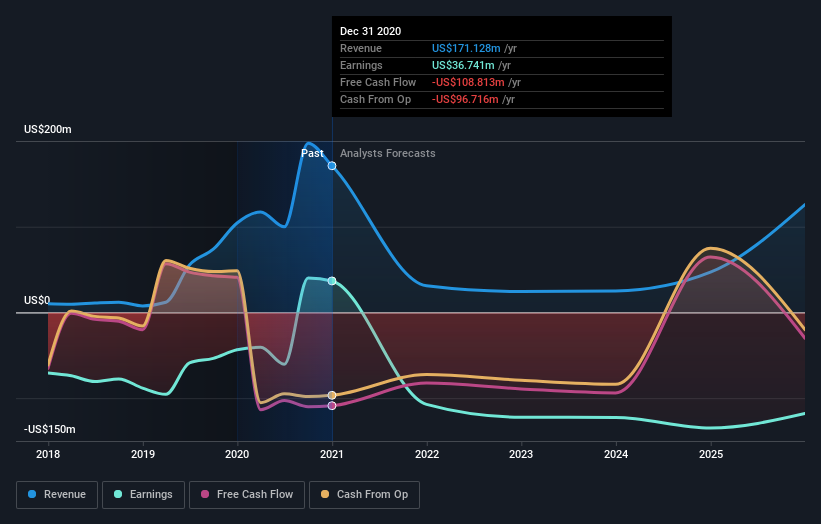What Kind Of Shareholders Hold The Majority In Voyager Therapeutics, Inc.'s (NASDAQ:VYGR) Shares?
A look at the shareholders of Voyager Therapeutics, Inc. (NASDAQ:VYGR) can tell us which group is most powerful. Insiders often own a large chunk of younger, smaller, companies while huge companies tend to have institutions as shareholders. Companies that used to be publicly owned tend to have lower insider ownership.
Voyager Therapeutics is a smaller company with a market capitalization of US$191m, so it may still be flying under the radar of many institutional investors. In the chart below, we can see that institutions are noticeable on the share registry. Let's delve deeper into each type of owner, to discover more about Voyager Therapeutics.
Check out our latest analysis for Voyager Therapeutics
What Does The Institutional Ownership Tell Us About Voyager Therapeutics?
Institutions typically measure themselves against a benchmark when reporting to their own investors, so they often become more enthusiastic about a stock once it's included in a major index. We would expect most companies to have some institutions on the register, especially if they are growing.
As you can see, institutional investors have a fair amount of stake in Voyager Therapeutics. This suggests some credibility amongst professional investors. But we can't rely on that fact alone since institutions make bad investments sometimes, just like everyone does. When multiple institutions own a stock, there's always a risk that they are in a 'crowded trade'. When such a trade goes wrong, multiple parties may compete to sell stock fast. This risk is higher in a company without a history of growth. You can see Voyager Therapeutics' historic earnings and revenue below, but keep in mind there's always more to the story.
Our data indicates that hedge funds own 9.0% of Voyager Therapeutics. That's interesting, because hedge funds can be quite active and activist. Many look for medium term catalysts that will drive the share price higher. Looking at our data, we can see that the largest shareholder is Third Rock Ventures, LLC with 17% of shares outstanding. In comparison, the second and third largest shareholders hold about 11% and 9.0% of the stock.
To make our study more interesting, we found that the top 5 shareholders control more than half of the company which implies that this group has considerable sway over the company's decision-making.
Researching institutional ownership is a good way to gauge and filter a stock's expected performance. The same can be achieved by studying analyst sentiments. There are plenty of analysts covering the stock, so it might be worth seeing what they are forecasting, too.
Insider Ownership Of Voyager Therapeutics
While the precise definition of an insider can be subjective, almost everyone considers board members to be insiders. Company management run the business, but the CEO will answer to the board, even if he or she is a member of it.
I generally consider insider ownership to be a good thing. However, on some occasions it makes it more difficult for other shareholders to hold the board accountable for decisions.
Shareholders would probably be interested to learn that insiders own shares in Voyager Therapeutics, Inc.. As individuals, the insiders collectively own US$5.7m worth of the US$191m company. This shows at least some alignment, but I usually like to see larger insider holdings. You can click here to see if those insiders have been buying or selling.
General Public Ownership
With a 12% ownership, the general public have some degree of sway over Voyager Therapeutics. While this group can't necessarily call the shots, it can certainly have a real influence on how the company is run.
Private Equity Ownership
With an ownership of 17%, private equity firms are in a position to play a role in shaping corporate strategy with a focus on value creation. Some might like this, because private equity are sometimes activists who hold management accountable. But other times, private equity is selling out, having taking the company public.
Public Company Ownership
Public companies currently own 11% of Voyager Therapeutics stock. We can't be certain but it is quite possible this is a strategic stake. The businesses may be similar, or work together.
Next Steps:
It's always worth thinking about the different groups who own shares in a company. But to understand Voyager Therapeutics better, we need to consider many other factors. Case in point: We've spotted 3 warning signs for Voyager Therapeutics you should be aware of, and 1 of them can't be ignored.
If you are like me, you may want to think about whether this company will grow or shrink. Luckily, you can check this free report showing analyst forecasts for its future.
NB: Figures in this article are calculated using data from the last twelve months, which refer to the 12-month period ending on the last date of the month the financial statement is dated. This may not be consistent with full year annual report figures.
This article by Simply Wall St is general in nature. It does not constitute a recommendation to buy or sell any stock, and does not take account of your objectives, or your financial situation. We aim to bring you long-term focused analysis driven by fundamental data. Note that our analysis may not factor in the latest price-sensitive company announcements or qualitative material. Simply Wall St has no position in any stocks mentioned.
Have feedback on this article? Concerned about the content? Get in touch with us directly. Alternatively, email editorial-team (at) simplywallst.com.


